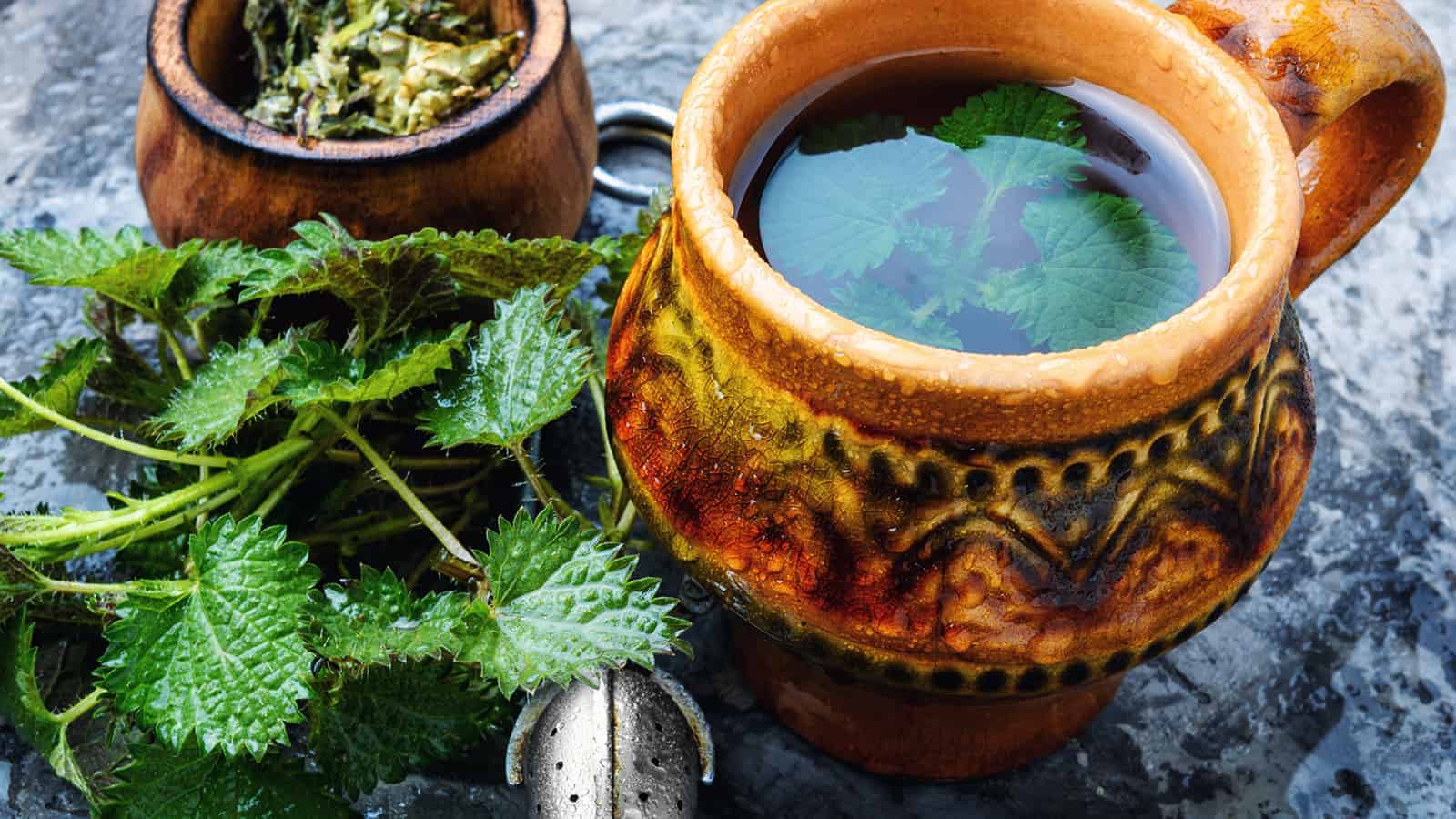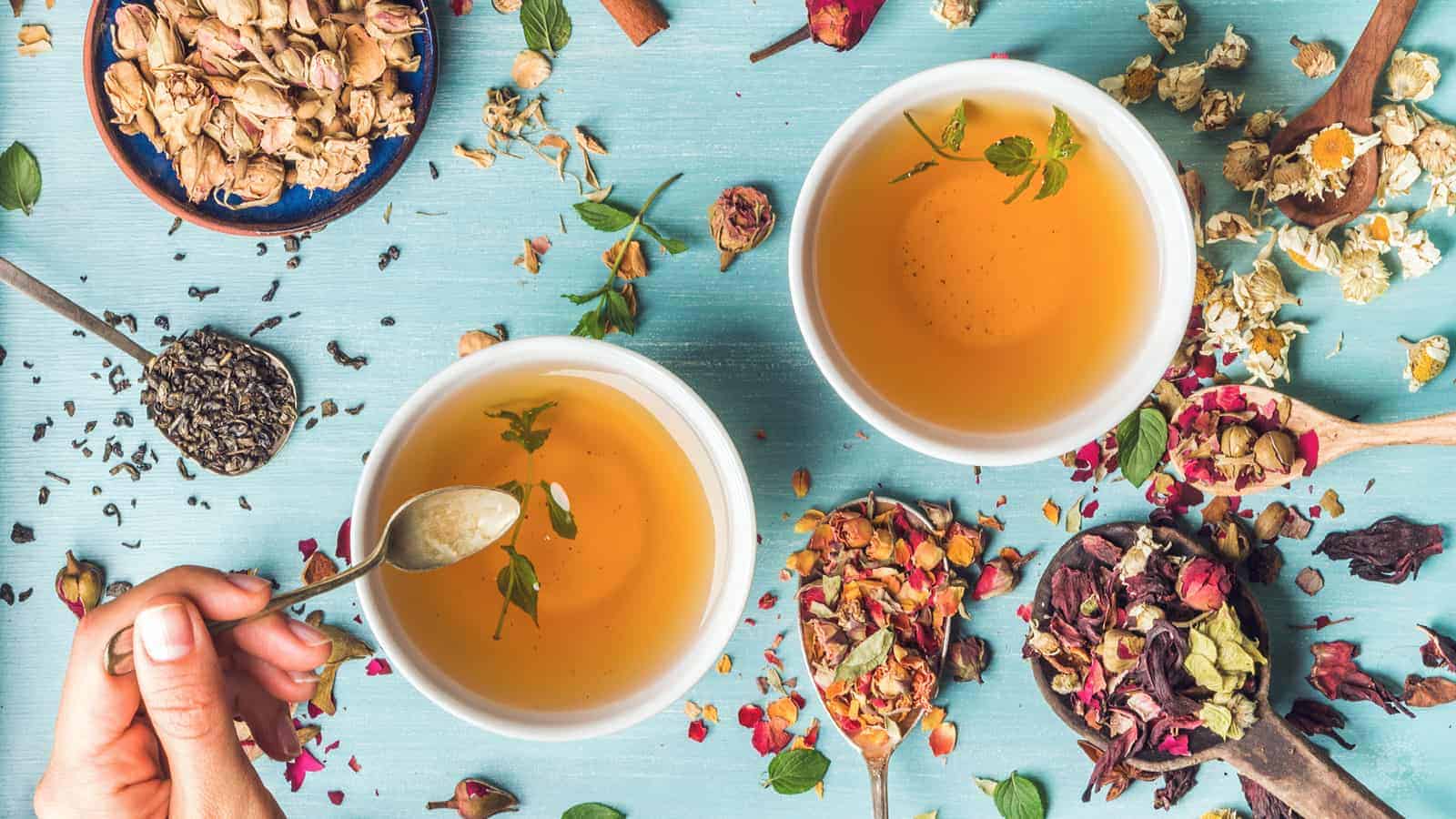Stinging nettle tea is a robust herbal beverage made from the roots and leaves of the herbal plant bearing the same name. As one of the most popular medicinal plant teas, nettles are brewed into tea worldwide because of their many health benefits. Science explains the ten primary reasons you should brew a cup of stinging nettle tea every day.
However, before we begin our discussion, we must caution you to check with your primary care physician or pharmacist before adding this herb to your diet. It can cause interactions with specific medications, primarily blood thinners.
What is a stinging nettle herbal plant?
The stinging nettle plant, or Urtica dioica, is part of a large family of perennial herbs. It’s called nettle, stinging nettle, or wild nettle. Nettles can grow up to 6 feet tall. The stinging nettle plant leaves have tiny hairs that contain chemicals that sting you if you touch them.
The plant has small green and white flowers clustered near the top of the stem of the plant. Stinging nettle plants are one of the most popular medicinal plants in the world. Part of its popularity is because nettles are easy to grow, so they’re inexpensive. Plus, they are very non-toxic, so you don’t need to worry about making tea with this herbal plant.
 Can you eat the stinging nettle plant?
Can you eat the stinging nettle plant?
In many rural areas, nettles are eaten in the springtime. The Romans ate nettles and used the roots to tenderize meats. Nettles mixed with potatoes and cheese is a popular dish, especially in poorer countries. Nettles can be cooked, boiled, or added to soups or salads. It’s a good substitute for spinach since it has a similar taste and consistency to this vegetable. It’s great in
- Pasta
- Soup
- Stews
- Juice
- Tonics
- Teas
You can buy stinging nettles in bulk from online health stores or natural grocery stores or grow it in your garden.
Ten surprising benefits of drinking stinging nettle tea
Here are ten compelling reasons to incorporate this hot beverage into your health routine.
1 – Urinary tract infections
Women get UTIs more than men. These infections can affect your bladder or urethra areas, but the disease may turn deadly if left untreated if it travels into your kidneys. Symptoms of a UTI include
- Pelvic pain
- Frequent urination
- Pain when you urinate
- Blood in your urine
- Cloudy dark urine
- Tiredness
- Fever and chills (if you have a fever)
If you have a UTI, your doctor will prescribe antibiotics, but stinging nettle tea is a great remedy for treating a urinary tract infection. The nettle tea helps flush out bacteria from your urinary tract.
2 – Reduces symptoms of osteoarthritis and joint pain
Joint pain and osteoarthritis are common problems as you age, especially if you’ve been active all your life. This wear and tear on your joints can be very painful. Taking non-steroid anti-inflammatory drugs (NSAID) is not a good long-term choice since they can put you at risk for heart attacks, strokes, and stomach problems.
One study found that stinging nettle tea can help reduce your joint pain and osteoarthritis, especially in your spine, hips, knees, and hands. You can also apply nettle leaves to your hands to reduce your joint pain.
3 – Provides an anti-itch solution for your dog
If your dog gets dry, itchy skin, especially in the winter, stinging nettles tea may be the solution. Make a strong tea from the stinging nettle plant. Allow the tea to cool completely, then pour the cooled tea all over your dog’s coat and skin until it’s soaked. Let your dog drip dry. This herb is a great anti-itch remedy.
However, don’t allow Fido to roll in the herb plants, the plant in its native form can irritate their skin, just like yours!
If you have any questions on using this herb on your pooch, then please call your vet first.
4 – Reduces an enlarged prostate
Studies suggest that stinging nettles compounds can help an enlarged prostate. It helps treat this condition by preventing the conversion of testosterone into dihydrotestosterone, a form of testosterone. This conversion is what helps reduce the amount of testosterone helps shrink the prostate. Some researchers think it could help treat prostate cancer.
5 – Lowers high blood pressure
Stinging nettles can be an effective way to moderate high blood pressure. High blood pressure causes a force of your blood against your artery walls is too high. High blood pressure is considered high if it’s 140/90 or higher. Sometimes there are no symptoms until you get your blood pressure checked by a doctor. Left untreated, high blood pressure can lead to stroke or heart disease. Doctors usually suggest eating a healthy diet, getting exercise, and if that doesn’t help, you’ll need to take medication to lower your blood pressure.
Early findings suggest that stinging nettle could be a possible remedy to lower your blood pressure, especially if you’re already on antihypertensive drugs that aren’t working. Be sure to talk with your naturopath before you start drinking nettle tea for your high blood pressure. They can suggest how much you should drink each day to prevent unwanted side effects.
6 – Works as an anti-inflammatory
If you suffer from inflammation, you may be tempted to grab an over-the-counter drug to ease your pain. But many of these drugs that are on the shelves have serious long-term side effects. Some doctors say an anti-inflammatory diet can help reduce some of your discomforts. Try drinking stinging nettle tea to ease your inflammation. Its anti-inflammatory ingredients help relieve pain in a natural, non-toxic way.
7 – Fights allergy symptoms
Stinging nettle tea can reduce your allergy reactions by stopping or slowing down your body’s histamine production when you encounter an allergen. When your body is allergic to something, it produces more histamines causing allergic symptoms like
- Sneezing
- Cough
- Itchiness
- Congestion
Researchers aren’t entirely sure how the nettle’s properties work, but they still believe that nettle tea effectively helps you feel better from an allergy.
8 – Prevents anemia
Anemia is a condition where your blood doesn’t get enough red blood cells, or your red blood cells don’t function properly. This leads to less oxygen being sent to your organs. Symptoms include
- Fatigue
- Pale skin
- Shortness of breath
- Dizziness
- Shortness of breath
- Rapid heartbeat.
Stinging nettles contain vitamins A, C, and iron. These help with your body’s production of red blood cells and help these cells work properly to prevent anemia.
9 – Reduces headaches
Stinging nettle tea has anti-inflammatory properties that help reduce pain, including your headaches. Stinging nettle tea is a safe non-steroid way to find relief if you suffer from chronic headaches.
10 – Anti-aging
Antioxidants help fight the toxins that attack and break down your cells, causing your skin to age. Stinging nettle extract used for teas or oils can raise your blood’s antioxidant levels and help your skin look younger and less aged.
Will stinging nettle tea interfere with medications?
Yes! If you take any medications, please check with your doctor or pharmacist before adding this to your diet.
Stinging nettle can interfere with certain medications. Medications like antiplatelet or anticoagulant drugs (blood thinners) are affected by nettle tea because this herbal plant reduces your blood’s clotting ability. Hence, it interferes with any blood-thinning drugs you’re on, such as the following:
- Warfarin
- Coumadin
- Clopidogrel
- Plavix
- Aspirin
- Diuretics
- Blood pressure medications
Other side effects include some diarrhea or stomach cramps in some people.
Can I grow my own stinging nettle herbal plant?
You can also grow stinging nettle plants since it’s a perennial herb plant. Just be sure to keep it in a pot because it’s a very invasive herb. If you grow your own stinging nettle plants, here’s how to harvest the leaves for tea.
Warning: Never harvest nettles for food or tea after the plant flowers since the older leaves contain cystoliths that are bad for your kidneys. If you want to gather leaves after the plant flowers, be sure to dry out the leaves, which will kill the cystoliths.
It’s easy to dry out the nettle leaves for tea. Gather the leaves (don’t forget the gloves). Bundle them in 5 to 8 branches. Hang to dry in a spot that gets lots of air. The leaves should dry out and crumble when you crush them. The leaves will not have the sting left, but the hairs may still be there and cause a little pain when you touch them. You can store the dried leaves in jars in a dark place for at least a year.
Nettle tea recipe
- 2-3 teaspoons of dried nettle leaves
- ½ teaspoon of cinnamon
- ¼ teaspoon of dried ginger
Mix these in a tea strainer. Pour boiling water through the filter into a mug. Cover the cup with a lid, then allow the tea to steep for 15 to 20 minutes.
 Final thoughts on adding nettle tea to your daily routine
Final thoughts on adding nettle tea to your daily routine
Stinging nettles are underestimated plants that researchers are beginning to notice. This herbal plant has a wide variety of proven health benefits. This plant can be used in cooking or medicines. Undoubtedly, researchers will continue to find ways to use this herb to help fight diseases and conditions naturally.


















